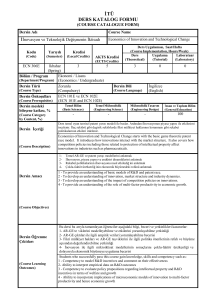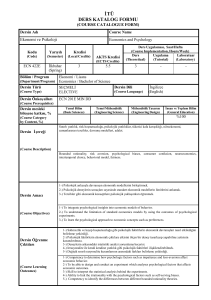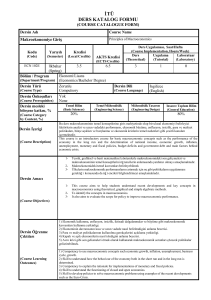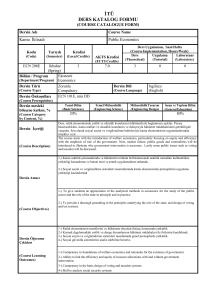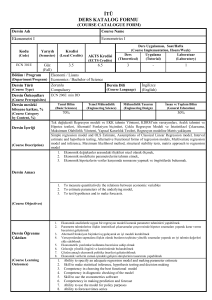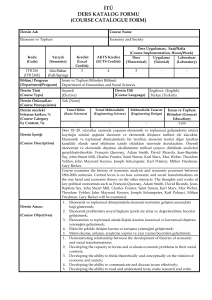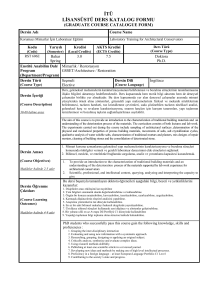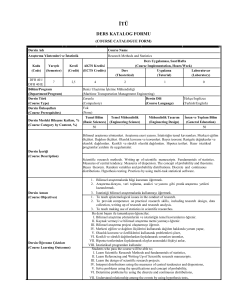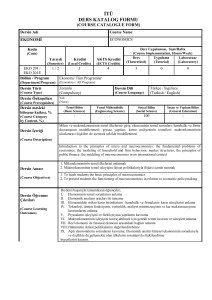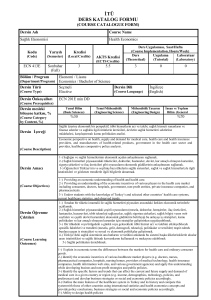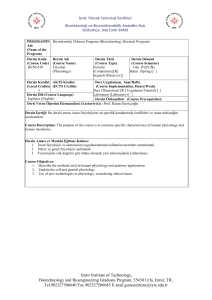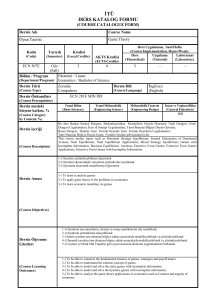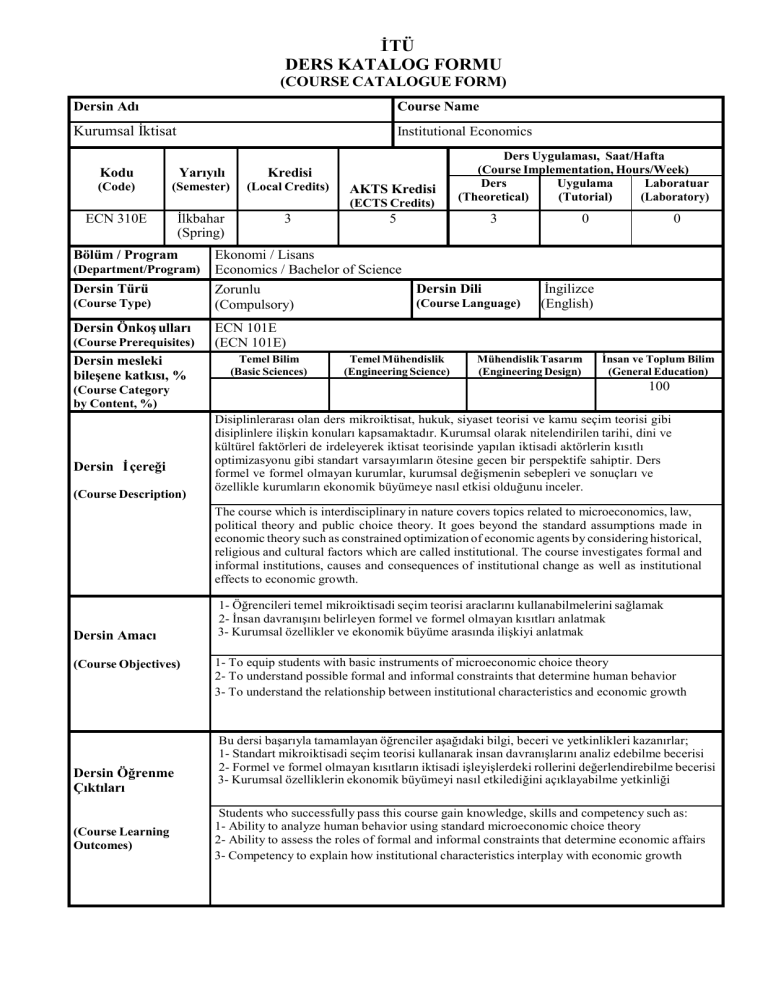
İTÜ
DERS KATALOG FORMU
(COURSE CATALOGUE FORM)
Dersin Adı
Course Name
Kurumsal İktisat
Institutional Economics
Kodu
Yarıyılı
Kredisi
(Code)
(Semester)
(Local Credits)
AKTS Kredisi
(ECTS Credits)
ECN 310E
İlkbahar
(Spring)
Bölüm / Program
(Department/Program)
Dersin Türü
(Course Type)
Dersin Önkoş ulları
(Course Prerequisites)
Dersin mesleki
bileşene katkısı, %
(Course Category
by Content, %)
Dersin İ çereği
(Course Description)
3
Ders Uygulaması, Saat/Hafta
(Course Implementation, Hours/Week)
Ders
Uygulama
Laboratuar
(Theoretical)
(Tutorial)
(Laboratory)
5
3
0
0
Ekonomi / Lisans
Economics / Bachelor of Science
Zorunlu
(Compulsory)
Dersin Dili
(Course Language)
İngilizce
(English)
ECN 101E
(ECN 101E)
Temel Bilim
(Basic Sciences)
Temel Mühendislik
(Engineering Science)
Mühendislik Tasarım
(Engineering Design)
İnsan ve Toplum Bilim
(General Education)
100
Disiplinlerarası olan ders mikroiktisat, hukuk, siyaset teorisi ve kamu seçim teorisi gibi
disiplinlere ilişkin konuları kapsamaktadır. Kurumsal olarak nitelendirilen tarihi, dini ve
kültürel faktörleri de irdeleyerek iktisat teorisinde yapılan iktisadi aktörlerin kısıtlı
optimizasyonu gibi standart varsayımların ötesine gecen bir perspektife sahiptir. Ders
formel ve formel olmayan kurumlar, kurumsal değişmenin sebepleri ve sonuçları ve
özellikle kurumların ekonomik büyümeye nasıl etkisi olduğunu inceler.
The course which is interdisciplinary in nature covers topics related to microeconomics, law,
political theory and public choice theory. It goes beyond the standard assumptions made in
economic theory such as constrained optimization of economic agents by considering historical,
religious and cultural factors which are called institutional. The course investigates formal and
informal institutions, causes and consequences of institutional change as well as institutional
effects to economic growth.
Dersin Amacı
(Course Objectives)
Dersin Öğrenme
Çıktıları
(Course Learning
Outcomes)
1- Öğrencileri temel mikroiktisadi seçim teorisi araclarını kullanabilmelerini sağlamak
2- İnsan davranışını belirleyen formel ve formel olmayan kısıtları anlatmak
3- Kurumsal özellikler ve ekonomik büyüme arasında ilişkiyi anlatmak
1- To equip students with basic instruments of microeconomic choice theory
2- To understand possible formal and informal constraints that determine human behavior
3- To understand the relationship between institutional characteristics and economic growth
Bu dersi başarıyla tamamlayan öğrenciler aşağıdaki bilgi, beceri ve yetkinlikleri kazanırlar;
1- Standart mikroiktisadi seçim teorisi kullanarak insan davranışlarını analiz edebilme becerisi
2- Formel ve formel olmayan kısıtların iktisadi işleyişlerdeki rollerini değerlendirebilme becerisi
3- Kurumsal özelliklerin ekonomik büyümeyi nasıl etkilediğini açıklayabilme yetkinliği
Students who successfully pass this course gain knowledge, skills and competency such as:
1- Ability to analyze human behavior using standard microeconomic choice theory
2- Ability to assess the roles of formal and informal constraints that determine economic affairs
3- Competency to explain how institutional characteristics interplay with economic growth
Ders Kitabı
Alston, Eggertsson, North (1998), Empirical Studies in Institutional Change,
Cambridge University Press
(Textbook)
Diğer Kaynaklar
(Other References)
North, D. (1990), Institutions, Institutional Change and Economic Performance,
Cambridge University Press
Coase, R. (1988), The Firm, the Market and the Law, University Chicago Press
Laboratuar Uygulamaları
Öğrenciler haftalık verilen okumaları yapmaları ve verilen problemleri çözmeleri
gerekmektedir. Ayrıca bir dönem projesi yapmaları gerekmektedir
The students should read the assigned materials and solve the assigned problems.
They should also write a term paper.
Yok
(Laboratory Work)
None
Bilgisayar Kullanımı
Yok
(Computer Use)
None
Diğer Uygulamalar
Yok
(Other Activities)
None
Baş arı
Değerlendirme
Sistemi
Faaliyetler
(Activities)
Yıl içi Sınavları
(Midterm Exams)
Kısa Sınavlar
(Quizzes)
Ödevler
(Homework)
Projeler
(Projects)
Dönem Ödevi/Projesi
(Term Paper/Project)
Laboratuar Uygulaması
(Laboratory Work)
Diğer Uygulamalar
(Other Activities)
Final Sınavı
(Final Exam)
Ödevler ve Projeler
(Homework & Projects)
(Assessment Criteria)
Adedi
(Quantity)
1
Değerlendirmedeki Katkısı, %
(Effects on Grading, %)
%30
5
%15
1
%15
1
%40
DERS PLANI
Hafta
1
2
3
4
5
6
7
8
9
10
11
12
13
14
Konular
Dersin
Çıktıları
Kurumsal İktisada Giriş
Bir Kurum olarak Hukuk Sistemi
7,8
Regulasyon ve Politika
7,8
Bir Kurum olarak Din
7
1
Sosyal Sınıflar ve Ekonomik Büyüme
3,4
Ulus Devletler
7,8
Uluslararası Kurumlar
8
Kurumsal Değişme
8
Rant Arayışı ve Ranttan Kaçınma
2,7
Coase ve Pigou
2,7
Yeni Politik Ekonomi
7,8
Kurumlar ve Ekonomik Büyüme I
3,4,8
Kurumlar ve Ekonomik Büyüme II
3,4,8
Son Tartışmalar-Kurumsal İktisadın Geleceği
1,7,8
COURSE PLAN
Weeks
1
2
3
4
5
6
7
8
9
10
11
12
13
14
Topics
Course
Outcomes
Introduction to Institutional Economics
Legal System as an Institution
1
7,8
Regulation and Politics
7,8
Religion as an Institution
7
Social Classes and Economic Growth
3,4
Nation States
7,8
International Institutions
8
Institutional Change
8
Rent Seeking and Rent Avoidance
2,7
Coase vs. Pigou
2,7
New Political Economy
7,8
Institutions and Economic Growth I
3,4,8
Institutions and Economic Growth II
3,4,8
Final Discussions-Future Research
1,7,8
Dersin Ekonomi Lisans Programıyla İlişkisi
Katkı
Seviyesi
1 2 3
Programın mezuna kazandıracağı bilgi ve beceriler (programa ait çıktılar)
a
b
c
d
e
f
g
h
Ekonomik ve sosyal problemleri, temsili aktörlerin amaç fonksiyonlarını bir takım kısıtlara tabi
olarak maksimize ettikleri ve buna bağ lı olarak çeşitli tarz dengelerin oluşturduğu ortamlar
şeklinde matematiksel olarak modelleyen iktisadi yaklaşımda yetkinlik.
Mikroiktisadi fiyat sistemini özel ve kamu malları ve uluslar arası ticaret bağ lamında öğrenip iş
stratejileri ve kamu politikaları tasarımında etkinlik ve eşitlik dengesini gözeterek hukuk
çerçevesinde kullanabilme yetkinliği. Bulguları Türkçe veya İngilizce olarak ifade edebilmek.
Fiyatların genel düzeyi, işsizlik ve çıktı düzeyine iliş kin temel makroekonomik modelleri inşa
edebilme kabiliyeti. Bulguları Türkçe veya İngilizce olarak ifade edebilme becerisi.
Ekonomik büyüme ve teknolojik geliş menin belirleyenlerini, sosyal fayda ve sosyal maliyetlerini
değ erlendirebilme kabiliyeti.
statistiki ve ekonometrik modelleme ve yöntemleri iktisadi ve sosyal verilerin bilgisayar
ortamında analiz edilmesinde ve yorumlanmasında temel düzeyde kullanabilme yetkinliğ i.
Bulguları Türkçe veya İngilizce olarak ifade edebilme becerisi.
Bir sektörün ekonomisinde uzmanlık geliştirme kabiliyeti. Yerli veya yabancı bir ülkedeki bir
sektörde uzmanlık.
Karar verme alanındaki standart iktisadi modellerde ve karar vermeye iliskin alternatif
varsayımlarda yetkinlik.
Yurt içinde veya dısındaki ekonomik kurumlar ve düzenlemeleri, tarihi, hukuki ve sosyal altyapıyı
dikkate alarak analiz etme yetkinligi. Bu tür bir analizi sektörel uzmanlıkla birlestirme becerisi
X
X
X
X
X
X
X
X
1: Az, 2. Kısmi, 3. Tam
Relationship of the course with the Bachelor of Science Program in Economics
The Knowledge, Skills and Competencies that Students will Gain from the Program
(Program Outputs)
a
b
c
d
e
f
g
h
Competency in the fundamental economic approach that models economic and social problems
mathematically as environments with various types of equilibria where representative agents
maximize their objective functions subject to a set of constraints.
Competency in the microeconomic price system in the context of private and public goods and
international trade, and the ability to design business strategies and public policies considering
efficiency-equity balance and the legal framework. Skill to express findings in Turkish or
English.
Ability to construct basic macroeconomic models regarding the general price level,
unemployment, and output. Skill to express findings in Turkish or English.
Ability to assess the social benefits, costs, and determinants of economic growth and
technological advancement.
Competency in statistical and econometric modeling and methods to analyze and interpret at a
basic level economic and social data in a computerized environment. Skill to express findings
in Turkish or English.
Ability to develop expertise in the economics of a sector. Specialty in a domestic or foreign
sector.
Competency in economic models of decision making and in alternative assumptions related to
decision-making.
Competency to analyze domestic or foreign economic institutions and regulations considering
the historical, legal, and social infrastructure. The skill to combine such an analysis with
sectoral expertise.
Level of
Contribution
1
2
3
X
X
X
X
X
X
1: Little, 2. Partial, 3. Full
Düzenleyen (Prepared by)
Tarih (Date)
14/06/2014
İmza (Signature)
X
X

